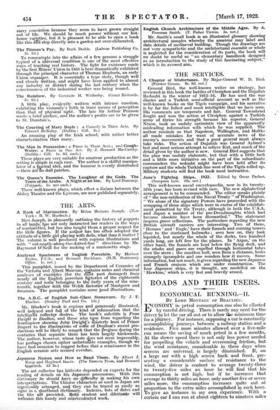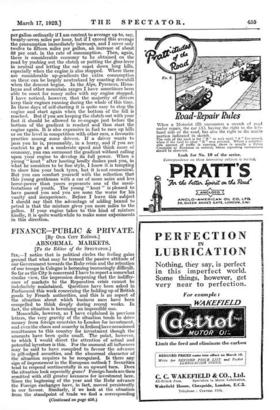ROADS AND THEIR USERS.
ECONOMICAL RUNNING.—II.
BYLORD MONTAGU OF BEAULIEU.
FCONOMY in petrol consumption can also be effected by careful driving. There is rarely any need for the driver to let the car all out or to allow tare minimum time for a j5iiiney. For instance, supposing a car is constantly accomplishing journeys between a railway station and a residence. Five more minutes allowed over a five-mile run means the saving of much petrol in a few months. At the slower speed there is not only less power needed for propelling the vehicle and overcoming friction, but the wind resistance, considerable in these days when screens are universal, is largely diminished. If, on a large car with a high screen back and front, pre- senting a considerable surface of resistance to the wind, the driver is content to average, twenty-three to twenty-five miles an hour he will find that his consumption is not high, but if he increases that average to thirty miles an hour, only another five or seven miles more, the consumption increases quite out of proportion to the extra miles accomplished in each hour. To give an instance in my own experience. With a certain car I can run at about eighteen to nineteen miles per gallon ordinarily if I am content to average up to, say, twenty-seven miles per hour, but it I exceed this average the consumption immediately increases, and I cover only twelve to fifteen miles per gallon, an increase of about 88 per cent. in the rate of consumption. Then, again, there is considerable economy to be obtained on the road by pushing out the dutch or putting the tear-leyer in neutral and letting the cat roost down long hills, especially when the engine is also stopped. Where there are considerable up-gradients the extra consumption on these can be largely neutralized by coasting downhill when the descent begins. In the Alps, Pyrenees, Hima- layas and other mountain ranges I have sometimes been able to coast for many miles with my engine stopped. I have noticed, however, that the majority of drivers keep their engines running during the whole of this time. In these days of self-starting it is quite easy to stop the engine and start again when the bottom of the hill is reached. But if you are keeping the clutch out with your foot it should be allowed to re-engage just before the bottom of the gradient is reached and thus start the engine again. It is also expensive in fuel to race up hills or on the level in competition with other cars, a favourite practice among some drivers. If a driver wants to pass you he is, presumably, in a hurry, and if you arc content to go at a moderate speed and think more of economy, you can surmount the gradient without calling upon your engine to develop its full power. When a young " knut " after hooting loudly dashes past you, in what he considers to be fine style, I know it is tempting to show him your back tyres, but it is not economical. But you can comfort yourself with the reflection that this young gentleman with a car of more noise and less horse-power than yours represents one of the mani- festations of youth. The young " knut " is pleased to have passed you and you are none the worse for his vanity and inexperience. Before I leave this subject I should say that the advantage of adding berizol to petrol is that the mixture gives you more miles to the gallon. If your engine takes to this kind of mixture kindly, it is quite worth while to make some experiments in this direction.











































 Previous page
Previous page